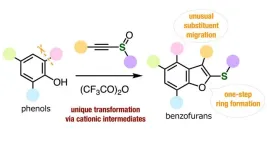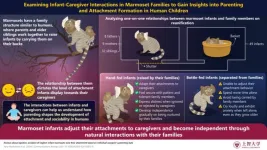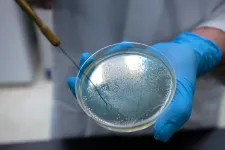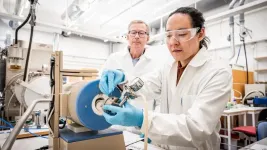(Press-News.org) Each summer, a hypoxic dead zone forms in the Gulf of Mexico, making some marine habitats unlivable. The dead zone is caused by nutrients—primarily from agricultural fertilizers—flowing into the Gulf from the Mississippi River. Restoring wetlands at field margins has been proposed to intercept some of the runoff, as wetland plants and soils are capable of absorbing nutrients like a living sponge. But estimates of nutrient removal by restored wetlands have varied widely. Shan Zuidema and colleagues took a whole-system approach to modeling the potential for wetlands to ameliorate the flow of nitrate to the Gulf. The authors found that wetland restoration through existing federal programs could not, in isolation, reduce nitrate by the 45%–60% needed to prevent the formation of the dead zone in the Gulf of Mexico. Even if fully utilized, these programs could, at most, reduce nitrate export to the Gulf by 30%. One reason for the gap is that many croplands are not suitable for wetland restoration, and the runoff from these croplands enters deeper flow-paths that cannot be intercepted by surface-level wetlands. According to the authors, additional management options, including other wetland restoration strategies, are also necessary to eliminate the dead zone in the Gulf of Mexico. The authors include one suggestion: Restoration of wetlands along or in rivers could potentially catch additional nitrate from agricultural lands not suitable for edge-of-field-wetlands.
END
Field-margin wetlands alone can’t fix the Gulf of Mexico’s dead zone
2024-04-16
ELSE PRESS RELEASES FROM THIS DATE:
Research has lost none of its innovative drive
2024-04-16
A high-profile study made headlines in 2023 stating that the scientific and innovation system is producing less and less completely new knowledge. Researchers at the University of Basel are now refuting this claim, at least for patents: It is based on a measurement error.
The discovery of mRNA in the 1960s was groundbreaking. Suddenly there were completely new findings that ushered in new developments. This kind of discovery is described as “disruptive”. In contrast, research findings are “consolidating” when they build upon existing knowledge. They are also important, as the example of the ...
A nematode gel to protect crops in Africa and Asia
2024-04-16
The fall armyworm is a destructive corn pest, which recently arrived in Africa and Asia from the Americas and began causing major yield losses and increased use of insecticides, which pose environmental and human health risks. Entomopathogenic nematodes are soil-dwelling roundworms that can parasitize and kill fall armyworms with no risks to people or the environment, but application can be tricky because the nematodes are susceptible to desiccation and UV radiation from sunlight. Patrick Fallet and colleagues report success using an innocuous biodegradable ...
Breakthrough in benzofuran synthesis: New method enables complex molecule creation
2024-04-16
In the field of organic chemistry, scientists are always looking out for new types of reactions to unlock synthesis routes for challenging compounds. Most of the progress that we have witnessed in pharmaceutics and agrochemicals over the past few decades can be traced back to the discovery of novel practical reaction pathways. Such pathways often involve the selective replacement of a functional group with another, the formation of aromatic rings, or the strategic cleaving of parts of a molecule. But what about the rearrangement of existing functional groups within a molecule?
Also known as ‘substituent ...
Exploring the interactions between baby marmosets and their caregivers
2024-04-16
The connection that infants form with their parents or caregivers is crucial for their cognitive, social, and emotional development. These attachments vary in quality, depending on how caregivers respond to the infant's needs. When caregivers are attentive, infants are likely to develop secure attachments. However, if caregivers neglect their needs, infants may develop insecurity, leading to challenges in emotional development and difficulty in forming healthy relationships later in life.
To understand how parenting influences attachment formation and child development, researchers led by Associate Professor Atsuko ...
MD Anderson and CureVac enter strategic collaboration to develop novel cancer vaccines
2024-04-16
HOUSTON and TÜBINGEN, Germany ― The University of Texas MD Anderson Cancer Center and CureVac N.V. today announced a co-development and licensing agreement to develop novel mRNA-based cancer vaccines.
The collaboration creates strong synergies between CureVac’s unique end-to-end capabilities for cancer antigen discovery, mRNA design, and manufacturing and MD Anderson’s expertise in cancer antigen discovery and validation, translational drug development, and clinical research. The collaboration will focus on the development of differentiated cancer vaccine ...
Deadly bacteria show thirst for human blood
2024-04-16
PULLMAN, Wash. – Some of the world's deadliest bacteria seek out and feed on human blood, a newly-discovered phenomenon researchers are calling “bacterial vampirism.”
A team led by Washington State University researchers have found the bacteria are attracted to the liquid part of blood, or serum, which contains nutrients the bacteria can use as food. One of the chemicals the bacteria seemed particularly drawn to was serine, an amino acid found in human blood that is also a common ingredient in protein drinks.
The research finding, published in the journal eLife, provides new insights into how bloodstream infections ...
New insights could unlock immunotherapy for rare, deadly eye cancer
2024-04-16
New research from the University of Pittsburgh explains why metastatic uveal melanoma is resistant to conventional immunotherapies and how adoptive therapy, which involves growing a patient’s T cells outside the body before reinfusing them, can successfully treat this rare and aggressive cancer.
In a paper published today in Nature Communications, the Pitt researchers also explain how they developed a new clinical tool that predicts which patients will respond to adoptive therapy. The work, supported by UPMC Enterprises, is helping improve personalized therapies and avoid futile treatments for metastatic uveal melanoma.
“The dogma was that uveal melanoma is ...
Biodiversity is key to the mental health benefits of nature, new study finds
2024-04-16
New research from King’s College London has found that spaces with a diverse range of natural features are associated with stronger improvements in our mental wellbeing compared to spaces with less natural diversity.
Published in Scientific Reports and funded by the National Institute for Health and Care Research (NIHR) and Wellcome, this citizen science study used the smartphone application Urban Mind to collect real-time reports on mental wellbeing and natural diversity from nearly 2000 participants.
Researchers found that environments with ...
A single atom layer of gold – LiU researchers create goldene
2024-04-16
For the first time, scientists have managed to create sheets of gold only a single atom layer thick. The material has been termed goldene. According to researchers from Linköping University, Sweden, this has given the gold new properties that can make it suitable for use in applications such as carbon dioxide conversion, hydrogen production, and production of value-added chemicals. Their findings are published in the journal Nature Synthesis.
Scientists have long tried to make single-atom-thick sheets of gold but failed because the metal’s tendency to lump together. But ...
Most countries struggle to meet climate pledges from 2009
2024-04-16
Nineteen out of 34 countries surveyed failed to fully meet their 2020 climate commitments set 15 years ago in Copenhagen, according to a new study led by UCL researchers.
The study, published in Nature Climate Change, compared the actual net carbon emissions of more than 30 nations to their 2009 pledged emission reduction targets set during the Copenhagen Climate Summit.
The paper led by researchers at UCL and Tsinghua University is the first effort to comprehensively gauge how well countries were able to meet their Nationally Determined Contribution reduction pledges from COP15.
Of the 34 nations analysed in the study, ...





